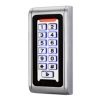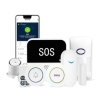Intercom System User Guide for Security Systems
What are Intercom Systems?
An intercom system is an electronic two-way communication device used in residential, commercial, or industrial settings. It helps transmit audio or video signals between two or more stations, allowing people to communicate with ease from different locations within a building.
Features of Intercom Systems
Intercom systems come with a variety of features that enhance security, communication, and convenience:
Audio/Video Communication: These systems can support either audio-only communication or both audio and video communication, allowing users to see who they are speaking with.
Multichannel Interface: Modern intercom systems feature multiple channels, enabling parallel communication between multiple parties.
Integration with other security systems: Intercom systems can be integrated with other security systems such as CCTV cameras, access control systems, and alarm systems to provide comprehensive security coverage.
Easy-to-use Interface: The user interface for intercom systems is designed for simplicity, making it easy for users to operate them even with minimal technical knowledge.
Portability and Flexibility: Today's wireless intercom systems provide portability and flexibility, allowing users to communicate effectively even from remote locations.
Applications of Intercom Systems
Intercom systems can be applied in a variety of settings to provide seamless communication and enhance overall security:
Residential: In residential buildings, intercom systems help homeowners screen visitors, monitor their surroundings, and communicate with family members in different rooms.
Commercial: In commercial settings such as offices, intercom systems are used to manage communication between staff, improving collaboration and productivity. They are also used to screen visitors or control access to restricted areas.
Industrial: In the industrial sector, intercom systems facilitate communication between workers in noisy environments or across large facilities, enhancing safety and efficiency.
Educational Institutions: Schools and colleges use intercom systems to communicate important announcements, manage access to certain areas, and improve overall security.
Healthcare Facilities: Hospitals and clinics utilize intercom systems to monitor patient wards, communicate between departments, and facilitate access control.
Why Are Intercom Systems So Important?
Intercom systems have become an indispensable tool in modern society due to their numerous advantages:
Safety and Security: Intercom systems significantly improve the safety of a property by allowing users to screen and identify visitors, monitor premises, and integrate with other security systems.
Efficient Communication: Easy and quick communication between multiple parties saves time, increases productivity, and improves overall efficiency.
Access Control: Intercom systems can be used to manage access to restricted areas, enhancing security and precluding unauthorized entry.
Emergency Alert: In case of emergencies, intercom systems can be used to alert building occupants, facilitating a timely response and evacuation.
Cost-effective: A well-integrated intercom system can help reduce overall security costs, as it allows users to communicate and monitor premises effectively without the need for additional security personnel.
Intercom System Installation and Usage Process
What is an Intercom System?
An intercom system is a two-way communication device that facilitates audio or video conversations between different locations within a property. It can have multiple stations, connecting various areas within a single building or a group of nearby buildings. Intercom systems are especially beneficial for access control, monitoring, and remote communication within secured premises.
Installation Process
The installation process may vary slightly depending on the type of intercom system you choose. However, there are general steps applicable to all installations:
Select an intercom system: Choose a suitable intercom system based on your needs and preferences. There are various options available in the market like wired, wireless, audio, and video intercom systems.
Site survey and evaluation: Survey the property to identify the appropriate locations for placing intercom stations. This includes entrances, exits, and other critical areas where communication may be required.
Install the central control unit: Place the central control unit in a secure location within the property. This unit manages and powers the entire intercom system.
Mount the intercom stations: Fix the individual intercom stations in the designated areas. Be sure to carefully follow the manufacturer's instructions and ensure proper wiring, if required.
Testing the system: Double-check the connections and test each station to ensure that they are functioning correctly. Fix any issues that arise during the testing phase.
Training: Train the relevant staff or family members on how to use and maintain the intercom system effectively. Provide the necessary documentation and contact information for troubleshooting, support, or maintenance.
Usage Process
Once the system is installed, using it is rather straightforward:
Initiate a call: To initiate a conversation, press the call button on your intercom station.
Establish two-way communication: The party on the other end will receive a notification and can communicate with the initiator by pressing the talk button.
Access Control: For security purposes, some intercom systems may support automated gates. In that case, the authorized individual at the receiving station can grant access by pressing the designated button on the intercom.
Monitor the premises: Many video intercom systems allow for monitoring from any station. Users can switch between available cameras to monitor the property.
Emergencies: In cases of emergency, some intercom stations are equipped with alarm buttons. Pressing this button may initiate an alarm, notify security personnel, or alert other users of the intercom system.
Intercom Systems Common Technical Troubleshooting FAQs
Q: My intercom system doesn't turn on. What should I do?
A: First, check if the power supply is properly connected. If it's connected, try resetting the system by unplugging, waiting for 30 seconds, and then plugging back in. If the issue persists, consult the system's manual or contact the manufacturer.
Q: There is static noise in my intercom system. How do I resolve this?
A: Ensure that all connections and wiring are properly secured. Adjust the system's volume, reposition antennas (if applicable), and check for nearby devices that may be causing interference. If the issue persists, it might be an internal issue, and it's best to contact the manufacturer or a professional technician.
Q: How do I add another station to my intercom system?
A: Check your system's manual for instructions on adding additional stations. Most systems have a specific process to follow. If you're unsure, contact the manufacturer for assistance.
Q: My intercom system has poor audio quality. What can I do to improve it?
A: Firstly, clean the microphone/speaker grilles and adjust the volume settings. If the problem persists, check for any loose connections or damaged cables. If everything seems fine, consider consulting a professional technician or the manufacturer.
Q: Can intercom systems be integrated with other security devices?
A: Yes, many modern intercom systems can be integrated with other security devices like CCTV cameras, access control systems, and alarm systems. Consult your system's manual or contact the manufacturer for more information on compatibility and integration options.
Suppliers of Intercom System
If you want to buy Intercom systems, or have questions about the types of Intercom systems, please leave us a message. iBirdView is your best choice. As professionals in the surveillance system industry, we are steadfast in our commitment to providing efficient, reliable, scalable and seamlessly integrated solutions to meet the needs of our valued customers. Not only can we help you choose the Intercom systems that best suit your needs, we can also provide comprehensive after-sales services, whether it is about the operation, repair or maintenance of Intercom systems.
Welcome to contact us to get the latest price of new Intercom systems. Competitive price, reliable quality, waiting for you to buy!


